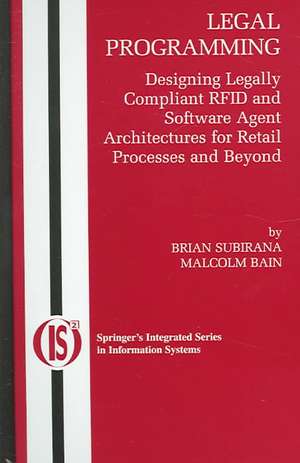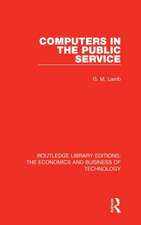Legal Programming: Designing Legally Compliant RFID and Software Agent Architectures for Retail Processes and Beyond: Integrated Series in Information Systems, cartea 4
Autor Brian Subirana, Malcolm Bainen Limba Engleză Mixed media product – 12 noi 2004
| Toate formatele și edițiile | Preț | Express |
|---|---|---|
| Paperback (1) | 704.36 lei 6-8 săpt. | |
| Springer Us – 14 noi 2014 | 704.36 lei 6-8 săpt. | |
| Mixed media product (1) | 996.88 lei 6-8 săpt. | |
| Springer Us – 12 noi 2004 | 996.88 lei 6-8 săpt. |
Din seria Integrated Series in Information Systems
- 15%
 Preț: 646.62 lei
Preț: 646.62 lei - 20%
 Preț: 996.07 lei
Preț: 996.07 lei - 20%
 Preț: 1272.94 lei
Preț: 1272.94 lei -
 Preț: 389.11 lei
Preț: 389.11 lei - 20%
 Preț: 998.04 lei
Preț: 998.04 lei - 15%
 Preț: 654.43 lei
Preț: 654.43 lei - 20%
 Preț: 1933.71 lei
Preț: 1933.71 lei -
 Preț: 388.52 lei
Preț: 388.52 lei - 15%
 Preț: 646.11 lei
Preț: 646.11 lei - 15%
 Preț: 667.71 lei
Preț: 667.71 lei - 15%
 Preț: 711.89 lei
Preț: 711.89 lei -
 Preț: 393.52 lei
Preț: 393.52 lei - 15%
 Preț: 644.82 lei
Preț: 644.82 lei - 18%
 Preț: 955.25 lei
Preț: 955.25 lei - 5%
 Preț: 1280.25 lei
Preț: 1280.25 lei - 15%
 Preț: 580.97 lei
Preț: 580.97 lei - 15%
 Preț: 638.11 lei
Preț: 638.11 lei - 20%
 Preț: 1277.24 lei
Preț: 1277.24 lei - 20%
 Preț: 1215.12 lei
Preț: 1215.12 lei - 20%
 Preț: 638.37 lei
Preț: 638.37 lei - 5%
 Preț: 1801.57 lei
Preț: 1801.57 lei - 18%
 Preț: 952.72 lei
Preț: 952.72 lei - 15%
 Preț: 653.14 lei
Preț: 653.14 lei - 20%
 Preț: 995.75 lei
Preț: 995.75 lei - 20%
 Preț: 649.28 lei
Preț: 649.28 lei
Preț: 996.88 lei
Preț vechi: 1246.10 lei
-20% Nou
Puncte Express: 1495
Preț estimativ în valută:
190.75€ • 199.69$ • 157.84£
190.75€ • 199.69$ • 157.84£
Carte tipărită la comandă
Livrare economică 05-19 aprilie
Preluare comenzi: 021 569.72.76
Specificații
ISBN-13: 9780387234144
ISBN-10: 0387234144
Pagini: 313
Ilustrații: XX, 314 p. With CD-ROM.
Dimensiuni: 155 x 235 x 23 mm
Greutate: 0.69 kg
Ediția:2005
Editura: Springer Us
Colecția Springer
Seria Integrated Series in Information Systems
Locul publicării:New York, NY, United States
ISBN-10: 0387234144
Pagini: 313
Ilustrații: XX, 314 p. With CD-ROM.
Dimensiuni: 155 x 235 x 23 mm
Greutate: 0.69 kg
Ediția:2005
Editura: Springer Us
Colecția Springer
Seria Integrated Series in Information Systems
Locul publicării:New York, NY, United States
Public țintă
ResearchCuprins
Contracts.- Intellectual Property Rights.- Consumer Protection.- Privacy.- Conclusions.
Recenzii
"Thought-provoking and far-sighted, this book provides a detailed analysis of the legal issues involved in on-line business and how a new generation of electronic agents can help. If you’re grappling with these issues today—or if you just want to see what’s coming tomorrow—this book is an excellent place to start." Thomas W. Malone, MIT Sloan School of Management
"Brian Subirana has written an excellent book addressing a topic which is becoming increasingly important in business today. As software, businesses and people become increasingly intertwined on-line, the legal ramifications of this emerging world will become a key area in the design of on-line systems and in public policy. The emergence and rapid adoption of RFID is making this topic even more pertinent, perhaps even urgent. This book is a visionary window into the future." Prof. Sanjay Sarma, MIT, Member of the Board of Governors of EPCglobal
"Brian Subirana has written an excellent book addressing a topic which is becoming increasingly important in business today. As software, businesses and people become increasingly intertwined on-line, the legal ramifications of this emerging world will become a key area in the design of on-line systems and in public policy. The emergence and rapid adoption of RFID is making this topic even more pertinent, perhaps even urgent. This book is a visionary window into the future." Prof. Sanjay Sarma, MIT, Member of the Board of Governors of EPCglobal
Textul de pe ultima copertă
The most advanced and ambitious aspect of ecommerce technology is the use of intelligent agent-based computing. Software agents are basically autonomous software entities that can react and interact with their environment, with more advanced intelligent agents being also adaptive, sociable and mobile. Agent technology is embryonic, current agent uses including network and system management, ecommerce decision and logistic support, organization and user assistance. These activities – and the related processes and programming – present serious and unresolved legal challenges, regarding issues such as privacy, confidentiality, electronic contracts, copyright issues and taxation.
LEGAL PROGRAMMING: Designing Legally Compliant RFID and Software Agent Architectures for Retail Processes and Beyond provides a process-oriented discussion of the legal concerns presented by agent-based technologies, processes and programming. It offers a general outline of the potential legal difficulties that could arise in relation to them, focusing on the programming of negotiation and contracting processes in a privacy, consumer and commercial context. The authors will elucidate how it is possible to create form of legal framework and design methodology for transaction agents, applicable in any environment and not just in a specific proprietary framework, that provides the right level of compliance and trust. Key elements considered include the design and programming of legally compliant methods, the determination of rights in respect of objects and variables, and ontologies and programming frameworks for agent interactions. Examples are used to illustrate the points made and provide a practical perspective.
This focus on processes integrates both human and automatic machine activities within the same conceptual framework. An analysis and understanding of the issues raised by the process (its characteristics and procedures) is valid forboth forms of activities. Also, it is a useful tool to consider the differences between agents that integrate the business processes, as part of the corporate or commercial platform (and can be designed legally accordingly), and those that are independent but then have to interact with the system –making process standardization or trading protocols obligatory. In describing the processes, the legal challenges consider the differences between human and automated performance – and then consider programming methods and tools to achieve compliance. This understanding assists in designing and building a technical architecture and related workflow, which integrates legal compliance and other requirements into the agent programming.
LEGAL PROGRAMMING: Designing Legally Compliant RFID and Software Agent Architectures for Retail Processes and Beyond provides a process-oriented discussion of the legal concerns presented by agent-based technologies, processes and programming. It offers a general outline of the potential legal difficulties that could arise in relation to them, focusing on the programming of negotiation and contracting processes in a privacy, consumer and commercial context. The authors will elucidate how it is possible to create form of legal framework and design methodology for transaction agents, applicable in any environment and not just in a specific proprietary framework, that provides the right level of compliance and trust. Key elements considered include the design and programming of legally compliant methods, the determination of rights in respect of objects and variables, and ontologies and programming frameworks for agent interactions. Examples are used to illustrate the points made and provide a practical perspective.
This focus on processes integrates both human and automatic machine activities within the same conceptual framework. An analysis and understanding of the issues raised by the process (its characteristics and procedures) is valid forboth forms of activities. Also, it is a useful tool to consider the differences between agents that integrate the business processes, as part of the corporate or commercial platform (and can be designed legally accordingly), and those that are independent but then have to interact with the system –making process standardization or trading protocols obligatory. In describing the processes, the legal challenges consider the differences between human and automated performance – and then consider programming methods and tools to achieve compliance. This understanding assists in designing and building a technical architecture and related workflow, which integrates legal compliance and other requirements into the agent programming.
Caracteristici
Provides a process-oriented discussion of the legal issues presented by agent-based technology. It works through these processes to produce a framework for designing a methodology for legal compliance, rights, etc. for intelligent agents performing and negotiating various types of transactions A hot topic in the EE/CS and IT fields and Subirana is on top of this research Includes supplementary material: sn.pub/extras


























